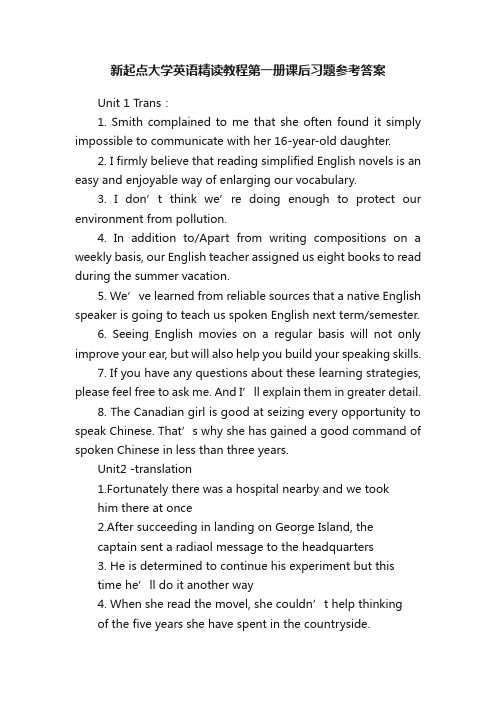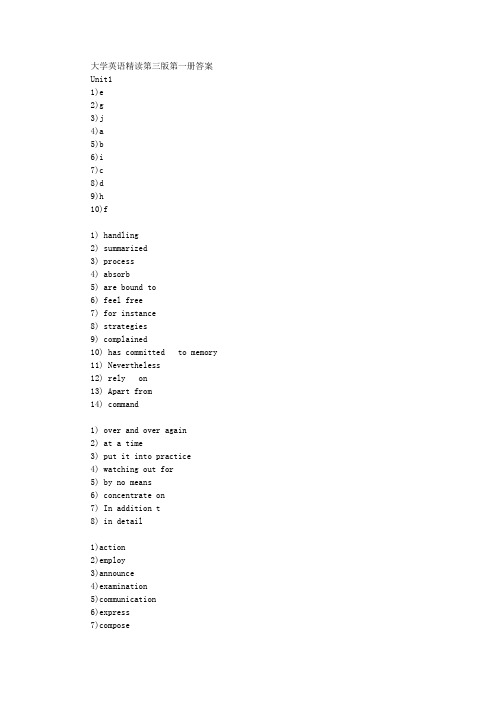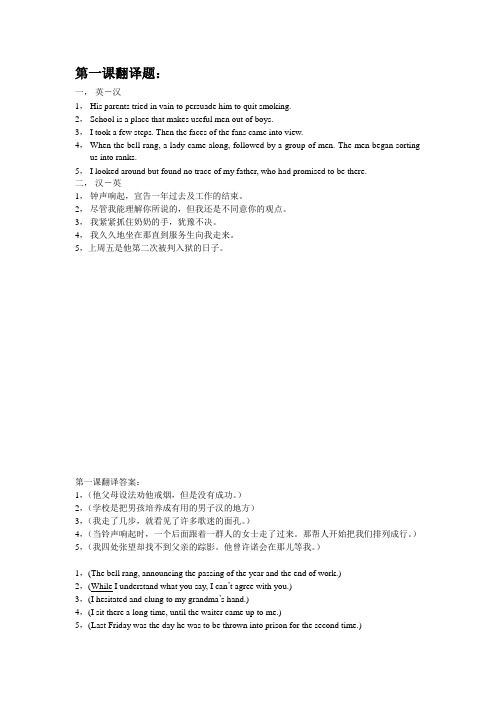精读课本第一册课后翻译练习答案
现代大学英语精读1翻译答案

综英翻译Unit 11.They took advantage of our helpless situation and took over our company.他们利用我们求助无门的困境把我们公司接管了。
2.Although there are still difficulties ahead of us, I am sure that we Chinese people will have the wisdom to bring about the peaceful unification of our country on our own.虽然我们面前仍有困难,但我肯定我们中国人有智慧靠自己实现国家的和平统一。
3.It is wrong to put emphasis on nothing but GDP. It will give rise to many serious problems.只强调国内生产总值是错误的,它会引起很多严重的问题。
4.He loves to show off his wealth, but that is all in vain. People still avoid him as though he were poison.他喜欢炫耀他的财富,但是这完全是徒劳的,人们仍然像躲避毒药那样躲避他。
5.He soon fell in love wit the village and was determined to make it a beautiful garden together with other villagers.他不久就爱上了这个村子。
他决心和村民一起把这个地方变成一个花园。
6.We must spend more money fighting against global warming. In addition, we must resort to tough laws. It is not just a matter of money.我们必须花更多的钱来和全球气温上升作斗争。
CollegeEnglishBook1精读第一册课后答案

CollegeEnglishBook1精读第⼀册课后答案Unit OneText A: Language FocusVocabularyI.Blank-filling1.1) respectable 2) agony 3) put..down 4) sequence 5) hold back 6) distribute7) off and on 8) vivid 9) associate 10) finally 11) turn in 12) tackle2.1) has been assigned to the newspaper’s Paris office.2) was so extraordinary that I didn’t know whether to believe him or not3) a clear image of how she would look in twenty years’ time4) gave the command the soldiers opened fire.5) buying bikes we’ll keep turning them out3.1) reputation rigid to inspire 2) and tedious What’s more out of date ideas3) compose career avoid showing hardly hold backII. Synomyms/doc/fe3343436.htmlposed2. severe3. agony4. extraordinary5. recall6. command7. was violating 8. anticipateIII. Collocation1.At2. For3. Of4. With5. As6. About7. To8. In in9. From10. On/uponComprehension ExercisesI.Cloze1.Text-related1)Hold back 2) tedious 3) scanned 4) recall 5) vivid 6) off and on7) turn out/in 8) career2.Theme-related1)Last 2) surprise 3) pulled 4) blowing 5) dressed 6) scene7) extraordinary 8) image 9) turn 10) excitementII.Translation1.Sentence2.PassageSusan lost her legs because of/in a car accident. For a time, she didn’t know how to face up to the fact that she would never (be able to) walk again.One day, while scanning (through) some magazines, a true story caught her eye/she was attracted by a true story. It gave a vivid description of how a disabled girl became a writer.Greatly inspired, Susan began to feel that she, too, would finally be able to lead a useful life.Text B:Comprehension Check1-6: CACDBDTranslation:1.我⽿朵⾥嗡嗡作响,听不见他们后来讲的话,只东⼀点西⼀点渗⼊⽚⾔只语。
新起点大学英语精读教程第一册课后习题参考答案

新起点大学英语精读教程第一册课后习题参考答案Unit 1 Trans:1. Smith complained to me that she often found it simply impossible to communicate with her 16-year-old daughter.2. I firmly believe that reading simplified English novels is an easy and enjoyable way of enlarging our vocabulary.3. I don’t think we’re doing enough to protect our environment from pollution.4. In addition to/Apart from writing compositions on a weekly basis, our English teacher assigned us eight books to read during the summer vacation.5. We’ve learned from reliable sources that a native English speaker is going to teach us spoken English next term/semester.6. Seeing English movies on a regular basis will not only improve your ear, but will also help you build your speaking skills.7. If you have any questions about these learning strategies, please feel free to ask me. And I’ll explain them in greater detail.8. The Canadian girl is good at seizing every opportunity to speak Chines e. That’s why she has gained a good command of spoken Chinese in less than three years.Unit2 -translation1.Fortunately there was a hospital nearby and we tookhim there at once2.After succeeding in landing on George Island, thecaptain sent a radiaol message to the headquarters3. He is determined to continue his experiment but thistime he’ll do it another way4. When she read the movel, she couldn’t help thinkingof the five years she have spent in the countryside.5. Mary thought it difficult to carry out her plan all by herself.6. We didn't think he could cover the distance in a quarter of an hour, but he succeeded in doing it.7. Even after his doctor told him he had lung cancer, Chichester would not give up his old dream of sailing round the world.8. I was busy making a new device for catching rats when Mark came and dragged me out to a flower show.Unit3. trans1. That famous actor seemed content to play a minor part in the play.2. National Day is round the corner. Let's give our bedrooma thorough clean.3. She agreed, very reluctantly, to be operated on by a young doctor..4. They've arranged for us to visit the Great Wall tomorrow. I'm sure we'll have a good time there (we'll enjoy ourselves there).5. After reading the letter the old man was so disappointed that he tore it into little bits with trembling fingers.6. The old couple were proud of their grandson, who won two gold medals and a bronze at the 28th Olympic Games.7. Even if his grandmother could not come to his birthday party, she would send him a lovely present. Tom was sure of that.8. It was Mary's twentieth birthday yesterday. Her father sent her a pair of boots. Her mother bought her a box of chocolates. And her boyfriend brought her a bunch of roses.Unit4.1. To take this job would involve working on weekends frequently, but John didn't mind. ?2. It is well known that lung cancer is caused at least in part by smoking too much.3. My grandparents said that the man who invented television had once lived in their neighborhood.4. I propose that we go to find Prof. Smith in his office right after the meeting and invite him to our English evening.5. Having been operated on twice for the disease, she was so weakened that she could barely stand up.6. Educators think that the generation growing up with television spend so much of their time in front of the TV that they do not have enough time to study.7. I do hope that you can come up with a better solution than this one.8. At first glance the picture didn't look very good, but after examining it carefully, we found that it was indeed a masterpiece.Unit 51. Jane picked up a magazine from the bookshelf and started reading here and there at random.2. With this letter I enclose some illustrations for the story.3. The ancient building was enclosed by a high wall.4. Dr. Green is busy working on a cure for AIDS, but from next month on he'll be able to fit in twenty patients or so on Monday morning.5. He told a story to illustrate why you should never sign any contract before you have examined its provisions in detail.6. She was embarrassed when they kept telling her she hada genius for mathematics.7. God knows when that dumb kid of ours is going to graduate from high school.8. Henry's latest novel and his daughter's first book were both published three months ago, and to their astonishment, the latter has already sold over a million copies.Unit 61. It was reported that the building of the railway had been held up by a flood.2. The strike resulted in the management's accepting the workers' demands.3. The coalminers decided to go on strike for better working conditions.4. I'd like very much to buy the English dictionary. Unfortunately, I haven't got enough money on me.5. I'd like to talk over with you about the English translation of the article before sending it to Mr. Hobbs.6. The foreign expert hopes to achieve all his aims in three years.7. What do you think a scientist must do in order to keep up with the latest developments in his field?8. The author thinks that if excellent workers get frequent pay increases and promotions, they will have greater incentive to produce.Unit 71. Sam could not afford (to buy) the camera he longed for because it was too expensive.2. He was busy writing the story all the morning, only breaking off occasionally to have some / a cup of tea.3. He is the son of a wealthy family, but he seems to have come down in the world.4. He often took advantage of her lack of business sense to cheat her.5. Prof. Wang, would you do us a favor by coming to our English evening this Saturday?6. He does not seem to be an old man in his eighties,considering his appearance.?7. Undoubtedly they do not have the intention of making an engineer of him, and I suspect they never will.8. I suspected there was no quality control whatsoever in the factory. After making observations for a week I found this was indeed the case.。
外教社大学英语精读1、2册课后翻译答案

外教社大学英语精读1、2册课后翻译答案第一册1:他这次考试失败使他意识到定期复习功课是多么重要。
He failed in the exam, which has made him realize the importance of reviewing his lessons regularly.2:请一定不要忘记离家前你父母对你说过的话。
Be sure not to forget what your parents said to you before you left home.3:我确信她的英语知识对这项工作来说是足够的。
I am sure her knowledge of English is adequate for the job.4:这篇文章的目的是告诉学生怎样培养良好的学习习惯。
The purpose of this article is to tell the students how to develop good study habits.5:在当今时代,人们越来越多地依赖计算机来解决各种各样的难题。
6:略读不仅帮助你对将要阅读的东西有所了解,还帮助你读的快些,提高你的阅读理解力。
7:有些人以为男孩子考试成绩总比女孩子好,然而,事实未必如此。
Some people think that boys…performanceon tests is always betterthangirls‟,that is not necessarily the case, however.8:即使智力一般的学生也可以通过改进学习习惯而成为优等生。
1:幸好附近有家医院,我们立即把他送到了那里。
Fortunately there was a hospital nearby and we took him there at once.2:胜利登上乔治岛后,船长向指挥部发了一份无线电报。
After succeeding in landing on George Island, the captain sent a radio message tothe headquarters by radio.3:他决心继续他的实验,不过这次他将用另一种方法来做。
大学英语精读第一册课后翻译题与答案

大英精读 1Unit 11、他这次考试的失败使他意识到定期复习功课的重要。
His failure in the exam has made him aware of the importance of reviewing his lessons regularly.2、请一定不要忘记离家前你父母对你说过的话。
Be sure not to forget what your parents said to you before you left home.3、我确信她的英语知识对这项工作来说是足够的了。
I'm sure her knowledge of English is adequate for the job.4、这篇文章的目的是告诉学生怎样培养良好的学习习惯。
The purpose of this article is to tell the students how to develop good study habits.5、在当今时代,人们越来越多地依靠计算机(computers) 来解决各种各样的问题。
In our age, people depend more and more on computers to solve various kinds of difficult problems.6、略读不仅可以帮助你对将要阅读的东西有所了解,还可以帮助你读得快些,提高你的阅读理解力。
Skimming not only helps you get some idea of what you are going to read but also helps you read faster and improve your comprehension.7、有些人以为男孩子比女孩子聪明。
然而,事实未必如此。
Some people believe that boys are cleverer than girls. This is not necessarily the case, however.8、即使智力一般的学生也可以通过改进学习习惯习惯而成为优等生。
大学英语精读第三版第一册课后习题 答案

大学英语精读第三版第一册答案Unit11)e2)g3)j4)a5)b6)i7)c8)d9)h10)f1) handling2) summarized3) process4) absorb5) are bound to6) feel free7) for instance8) strategies9) complained10) has committed to memory11) Nevertheless12) rely on13) Apart from14) command1) over and over again2) at a time3) put it into practice4) watching out for5) by no means6) concentrate on7) In addition t8) in detail1)action2)employ3)announce4)examination5)communication6)express7)compose8)improvement9)concentration10)management11)consider12)motivate13)development14)movement15)discuss16)operate17)division18)production19)educate20)repeat1) additional2) add3) addition4) addition1) effectively2) effect3) effective4) effect1) helpful2) help3) helpless4) help5) helplessly6) helpfully7) helpful1) reliant2) reliable3) reliance reliable4) relies5) reliably6)1) repetition2) repeating3) repeatedly4) repeated5) repetition1) In my opinion2) According to Mary3) In our opinion4) According to today's papers5) In most doctors' opinion According to most doctors1) Shakespeare was not only a dramatist but also an actor.2) Miss Crain not only took me home in her car, but also came the next day to see if I had recovered.3) Hainan Island attracts tourists not only in winter but also in summer.4) There is always a black market not only in Britain, but also in other European countries.5) At the Athens Olympics in 2004, Liu Xiang not only won a gold medal in the 110-meter hurdles, but also broke the Olympic record.1) It is true that your sentences are all grammatically correct, but they don’t make any sense.2) It is true that they lost that battle, but they still went on fighting.3) It is true that Tom’s very clever and hardworking, but I still don’t think he is the right person for the job.4) It is true that learning English is by no means easy, but we can make the task easier by using some learning strategies.1) strategies2) frequently3) over and over again4) commit to memory5) acquaintance6) watch out for7) communicate8) process9) opportunities10) rely on11) put into practice12) absorbed1) if2) about3) it4) know5) up6) as7) addition8) even9) into10) other11) for12) while1) memorize2) a matter of3) taught4) shelf5) realize6) written7) idiomatic8) join in9) difference10) gain a good command翻译1) 史密斯太太对我抱怨说,她经常发现与自己十六岁的女儿简直无法沟通。
大一上册精读课后翻译练习

第一课翻译题:一,英-汉1,His parents tried in vain to persuade him to quit smoking.2,School is a place that makes useful men out of boys.3,I took a few steps. Then the faces of the fans came into view.4,When the bell rang, a lady came along, followed by a group of men. The men began sorting us into ranks.5,I looked around but found no trace of my father, who had promised to be there.二,汉-英1,钟声响起,宣告一年过去及工作的结束。
2,尽管我能理解你所说的,但我还是不同意你的观点。
3,我紧紧抓住奶奶的手,犹豫不决。
4,我久久地坐在那直到服务生向我走来。
5,上周五是他第二次被判入狱的日子。
第一课翻译答案:1,(他父母设法劝他戒烟,但是没有成功。
)2,(学校是把男孩培养成有用的男子汉的地方)3,(我走了几步,就看见了许多歌迷的面孔。
)4,(当铃声响起时,一个后面跟着一群人的女士走了过来。
那帮人开始把我们排列成行。
)5,(我四处张望却找不到父亲的踪影。
他曾许诺会在那儿等我。
)1,(The bell rang, announcing the passing of the year and the end of work.)2,(While I understand what you say, I can’t agree with you.)3,(I hesitated and clung to my grandma’s hand.)4,(I sit there a long time, until the waiter came up to me.)5,(Last Friday was the day he was to be thrown into prison for the second time.)第二课翻译1,他一直工作至深夜。
大学英语精读一课后答案(完整版)

大学英语精读一课后答案(完整版)大学英语精读一课后答案(完整版)大学英语精读第三版(上海外语教育出版社董亚芬主编)第一册Book1 Unit1答案1)e2)g3)j4)a5)b6)i7)c8)d9)h10)f1) handling2) summarized3) process4) absorb5) are bound to6) feel free7) for instance8) strategies9) complained10) has committed to memory11) Nevertheless12) rely on13) Apart from14) command1) over and over again2) at a time3) put it into practice4) watching out for5) by no means6) concentrate on7) In addition t8) in detail1)action2)employ3)announce4)examination5)communication6)express7)compose8)improvement9)concentration10)management11)consider12)motivate13)development14)movement15)discuss16)operate17)division18)production19)educate20)repeat1) additional2) add3) addition4) addition1) effectively2) effect3) effective4) effect1) helpful2) help3) helpless4) help5) helplessly6) helpfully7) helpful1) reliant2) reliable3) reliance reliable4) relies5) reliably6)1) repetition2) repeating3) repeatedly4) repeated5) repetition1) In my opinion2) According to Mary3) In our opinion4) According to today's papers5) In most doctors' opinion According to most doctors1) Shakespeare was not only a dramatist but also an actor.2) Miss Crain not only took me home in her car, but also came the next day to see if I hadrecovered.3) Hainan Island attracts tourists not only in winter but also in summer.4) There is always a black market not only in Britain, but also in other European countries.5) At the Athens Olympics in 2004, Liu Xiang not only won a gold medal in the 110-meter hurdles,but also broke the Olympic record.1) It is true that your sentences are all grammatically correct, but they don’t make any sense.2) It is true that they lost that battle, but they still went on fighting.3) It is true that T om’s very clever and hardworking, but I still don’t think he is the right person forthe job.4) It is true that learning English is by no means easy, but we can make the task easier by usingsome learning strategies.1) strategies2) frequently3) over and over again4) commit to memory5) acquaintance6) watch out for7) communicate8) process9) opportunities10) rely on11) put into practice12) absorbed1) if2) about3) it4) know5) up6) as7) addition8) even9) into10) other11) for12) while1) memorize2) a matter of3) taught4) shelf5) realize6) written7) idiomatic8) join in9) difference10) gain a good command翻译1) 史密斯太太对我抱怨说,她经常发现与自己十六岁的女儿简直无法沟通。
- 1、下载文档前请自行甄别文档内容的完整性,平台不提供额外的编辑、内容补充、找答案等附加服务。
- 2、"仅部分预览"的文档,不可在线预览部分如存在完整性等问题,可反馈申请退款(可完整预览的文档不适用该条件!)。
- 3、如文档侵犯您的权益,请联系客服反馈,我们会尽快为您处理(人工客服工作时间:9:00-18:30)。
Unit11.我累了。
昨晚我不该那么晚睡觉。
(should not+动词完成式)I’m tired. I shouldn’t have gone to bed so late last night.2.我和鲍勃不是很熟,不过我们偶尔一起出去喝一杯。
(occasional)I don’t /didn’t know Bob very well, but we go/went out for an occasional drink together.3.我们应该到火车站接她。
(be supposed to)We’re supposed to meet her at the train station.4.你可以清楚地看到有人快要淹死(drown),而你却没有采取行动救他们。
(take action)You could clearly see people drowning, but/and yet you took no action to save them.5.包括周末在内,仅仅还有12天时间可以用来买圣诞(Christmas)礼物。
(including)Including weekends, there are only twelve more days to buy Christmas presents.6.如果不立即采取行动,许多种野生动物就会因饥饿而死亡。
(without, hunger)Without immediate action, many kinds of wild animals would die from hunger.Unit21.那首歌总是使她回想起在芝加哥度过的那个夜晚。
(remind…of…)That song always reminded her of the night spent in Chicago.2.街角处刚巧有一位警察,我便向他问路。
(happen to, corner)There happened to be a policeman on the corner, so I asked him the way.3.由于天气恶劣,今天所有去纽约的航班都延误了。
(delay)All flights to New York today are /were delayed because of the bad weather.4.谁有责任谁就必须赔偿损失。
(whoever, responsible)Whoever is responsible will have to pay for the damage.5.我找不到我的支票薄。
我准是把它留在家里了。
(checkbook, must have)I can’t find my checkbook .I must have left it at home.6.到足球比赛快开始时,暴风雨已经停了。
(by the time)By the time the football match was going to start, the storm had already stopped.Unit31.除非你有经验,否则你得不到这份工作。
(unless)You won’t get the job unless you’ve got the experience.2.我把大部分时间花在研究中美文化的差异上了。
(spend)Most of my time is spent studying the differences between Chinese and American cultures.3.这句话意思极清楚,决不会引起误解。
(so…that)The statement /sentence is so clear that it can’t cause any misunderstanding.4.他希望能够给予她比现在更多的帮助。
(more than)He wishes he could give her more help than he does.5.穿上外套,否则你会感冒的。
(or)Put on your coat or you’ll catch cold.6.她的收藏品中增加了一张毕加索(Picasso)的画。
(a dd…to…)She has added a Picasso to her collection.7.我没意识到以前曾来过这儿。
(be aware of)I am not aware of ever having been here before.8.如果你继续对每个人这么粗鲁,你很快就会发现自己什么朋友都没有了。
(find oneself without)You will soon find yourself without any friends at all if you keep on being so rude to everybody. Unit41.房间里热极了,请把窗户打开!(far too)It’s far too hot in the room; open the window, please!2.半夜里那嘈杂声把我们弄醒了。
(in the middle of)The noise woke us up in the middle of the night.3.他不应该对我说的话表示生气,那仅仅是个玩笑而已。
(nothing more than)He shouldn’t have been angry at what I said. It was nothing more than a joke.4.我们邀请了所有的朋友去野餐,但是由于下雨只来了其中的五位。
(show up)We invited all our friends to the picnic but it rained and only five of them showed up.5.她视婚姻为严肃的事情。
(view…as)She views marriage as a serious matter.6.令我失望的是,这部电影并不像我期望的那么好。
(live up to somebody’s expectations)To my disappointment, the movie didn’t live up to my expectations.Unit51.我过去常去看电影,但现在再也没有时间了。
(used to)I used to go to the cinema/movies a lot, but I never have the time now.2.两个工人互相合作修理破裂的管子。
(cooperate)The two workers cooperated with each other to fix the broken pipe.3.这是一种残忍的做法,应该马上停止。
(…practice which…)This is a cruel practice which should be stopped immediately.4.你的工作的哪一方面最困难,哪一方面最有益(rewarding)?(aspect)What aspect of your job/work is (the) most difficult, and what aspect is (the) most rewarding?5.有些人认为他很粗野,但情况并非如此。
(the case)Some people think he is rude, but that’s not the case.6.我会尽我所能帮忙,但我所能做的也有限。
(a limit to)I’ll help as much as I can, but there is a limit to what I can do.Unit71.我们正在考虑卖房子。
(consider)We’re considering selling the house.2.我建议他先等一会儿,然后再做决定。
(suggest)I suggest he wait a while before he makes any decision.3.明天约翰很可能会来参加聚会。
(be likely to)John is very likely to come to the party tomorrow.4.我们想知道她不接受这份工作的原因。
(reason)We’d like to know the reason why she didn’t accept the job.5.你本不应该再回到那幢还在燃烧的(burning)大楼,你有可能会被严重烧伤的。
(shouldn’t have, might have)You shouldn’t have gone back to the burning building—you might have been badly/seriously burnt.6.我从来没有想过会有问题。
(cross one’s mind)It/The thought had never crossed my mind that there might be a problem.Unit81.第二次世界大战发生于1939年。
(take place)World War II took place in 1939.2.我爷爷喝酒喝得厉害。
(a great deal)My grandfather drinks a great deal.3.到65岁的时候,他仍在工作。
(by the age of)He was still working by the age of 65.4.这个老师知道他所有学生的名字。
(by name)The teacher knows all his students by name.5.警察最终成功破解了这个疑案。
(succeed in)The police have finally succeeded in solving the mystery.6.他喜欢各种体育运动,特别是篮球。
(most of all)He likes all kinds of sports, but most of all, basketball.7.打电话和面对面说话不一样。
(face to face)Talking on the phone is different from talking face to face.8.他们因为有共同的兴趣爱好而相爱。
